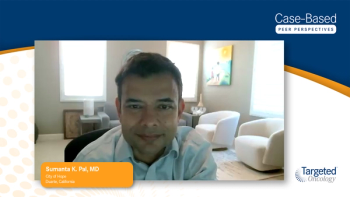Therapeutic Sequencing for Relapsed/Refractory Metastatic Renal Cell Carcinoma

A panelist discusses how second-line therapy goals typically shift from pursuing complete remission (as in first-line treatment) to focusing more on disease control, quality of life management, and balancing treatment effectiveness with tolerability based on the patient's prior therapy experience.

A panelist discusses how second-line treatment options for kidney cancer have evolved through multiple clinical trials including Study 205, METEOR, CONTACT-03, TIVO-3, TiNivo-2, and LITESPARK-005, which have demonstrated varying efficacy across different patient populations and prior therapies, particularly noting the impact of prior immunotherapy exposure on treatment selection and the need for careful consideration of historical trial data in the context of modern treatment paradigms.

A panelist discusses how the CONTACT-03 and TiNivo-2 studies yielded important insights about ICI rechallenge and tivozanib in the post-ICI setting, with particular attention to the notable 9.2-month median PFS with tivozanib monotherapy, the impact of dosing strategies, and the timing of therapy initiation, though questions remain about the broader implications for ICI rechallenge efficacy across different treatment contexts.

A panelist discusses how patient-reported outcomes and real-world evidence contribute valuable insights into the practical impact of these treatments, complementing traditional efficacy measures and helping inform clinical decision-making in actual practice settings.

A panelist discusses how second-line therapy selection in metastatic RCC requires careful consideration of multiple factors including prior treatment response, individual patient characteristics, specific drug properties (such as mechanism of action and pharmacokinetics), strength of clinical evidence, and practical considerations like tolerability and quality of life, while acknowledging current evidence gaps and unmet needs in the post-ICI treatment landscape.

A panelist discusses how treatment sequencing decisions in RCC span multiple lines of therapy, incorporating various options like tivozanib, lenvatinib-everolimus combinations, and belzutifan, with careful consideration given to optimal dosing strategies, expected duration of therapy, anticipated response patterns, and the specific timing of each agent in the treatment journey, particularly in the post-ICI setting.

A panelist discusses how managing adverse events associated with TKIs and belzutifan requires a proactive approach encompassing prevention strategies, regular monitoring, dose modifications when needed (particularly for combination regimens), and evidence-based mitigation techniques, while considering the distinct toxicity profiles of each agent and the impact of dose adjustments on treatment efficacy.

A panelist discusses how emerging research in RCC treatment encompasses several promising investigational approaches that could potentially reshape the therapeutic landscape, from novel drug combinations to innovative treatment strategies that may address current gaps in care.



